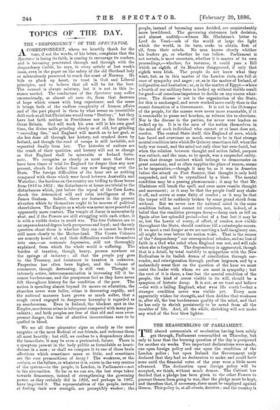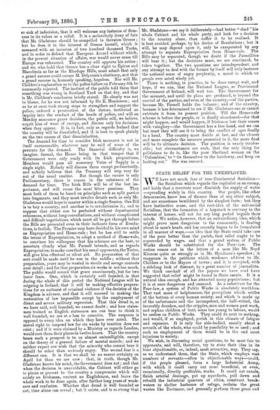THE REASSEMBLING OF PARLIAMENT.
THE absurd ceremonials of re-election having been safely got through, Parliament reassembled on Thursday, but only to hear that the burning question of the day is postponed for another six weeks. Two important declarations were made, one upon foreign policy and one upon the condition of the London police ; but upon Ireland the Government cnly declared that they had no declaration to make, and could have none until the financial votes of the year were a little more advanced. The declaration upon foreign policy will be accepted, we think, without much demur. The Cabinet has decided that a pledge has been given to the other Powers to prevent Greece from going to war, that the pledge must be kept, and therefore that, if necessary, force must be employed against Greece. This policy is, at all events, decisive ; and the country is
so sick of indecision, that it will welcome any instance of firm- ness in its rulers as a relief. It is a melancholy irony of fate that Mr. Gladstone should be compelled to threaten Greece ; but he does it in the interest of Greece herself, which is menaced with an invasion of two hundred thousand Turks, and in order to defend that European Accord without which, in the present situation of affairs, war would never cease till Europe was exhausted. The country will approve his action ; and we, who hold that Greece has a clear right to Epirus and Macedonia as far as the Rhodope Hills, must admit that only a grand success could excuse M. Delyannis's obstinacy, and that a grand success is, humanly speaking, hopeless. Nor will Mr. Childers's explanation as to the police failure on February 8th be summarily rejected. The instinct of the public told them that something was wrong in Scotland Yard on that day, and that is Mr. Childers's conclusion briefly stated. He clearly was not to blame, for he was not informed by Sir E. Henderson ; and as he at once took strong steps to strengthen and support the police, ordered a prosecution of the rioters, instituted an inquiry into the conduct of the heads of police, and will on Monday announce grave decisions, the public will, we believe, acquit him of want of energy, and discuss only his decisions when they appear. It is, in fact, only as regards Ireland that the country will be dissatisfied, and it is best to speak plainly on the two causes of that dissatisfaction.
The demand for time to consider Irish measures is not in itself unreasonable, whatever may be said of some of the pretexts for the demand. The financial difficulty is, we imagine, formal, the House being in that temper that if Government were only ready with its Irish propositions, Members would pass all necessary Votes of Supply in a single night. Nobody will discuss them except perfunctorily, and nobody believes that the Treasury will step very far out of the usual routine. But though the excuse is only Parliamentary, there is reason in the substance of the demand for time. The Irish Bills will be of the last im- portance, and will rouse the most bitter passions. They must both of them be based on principles such as split parties into fragments, and they must involve details such as only Mr. Gladstone would hope to master within a single Session. One Bill is to buy a country, and another is to revolutionise it ; and to suppose that either can be perfected without departmental references, without long consultations, and without complicated and difficult negotiations, which must all be got through before the Bills are presented even in their inchoate form of Resolu- tions, is foolish. The Premier may have decided in his own mind on Expropriation and Home-rule ; but he has still to settle the terms of Expropriation, to adopt a method of Home-rule, to convince his colleagues that his schemes are the best, to ascertain clearly what Mr. Parnell intends, and as regards Expropriation, to make sure that his usual opponents, the Tories, will give him effectual or silent aid. No preparation of that sort could be made until he was in the saddle ; without that preparation, years may be wasted in sterile and savage contests over detail ; and for that preparation six weeks is not too much. The public would accord that grace unanimously, but for two inner fears. One, which is certainly well founded, is that during the whole of this period the National League will be reigning in Ireland, that it will be making effective prepara- tions for an outburst of criminal violence if the decision of the Kingdom is adverse, and that it will succeed in making the restoration of law impossible except by the employment of direct and severe military repression. That this dread is, as we have said, well founded, we cannot doubt ; and how states- men trained as English statesmen are can bear to think it well founded, we are at a loss to conceive. The suspense is opposed to every idea on which they have ever acted. The moral right to suspend law for six weeks by inaction does not exist ; and if it were claimed by a Ministry as regards London, would cost them their places in twelve hours. That the country bears such a prospect is to us almost unintelligible, except on the theory of a general failure of mental muscle; and we neither expect nor wish that the minority who cannot bear it should be other than seriously angry. The second fear is a different one. It is that we shall be no nearer certainty on April 1st than we are now; that, in truth, though Mr. Gladstone knows his mind, the Government does not ; and that when the decision is unavoidable, the Cabinet will either go to pieces or present to the country a compromise which will satisfy no Irishman, content no Englishman, and leave the whole work to be done again, after further long years of weak- ness and confusion. Whether that dread is well founded or not, time alone can reveal ; but it exists, and is so strong that Mr. Gladstone—we say it deliberately—had better "shed "his whole Cabinet and his whole party, and look for a decision to the country alone, than suffer it to be realised. It is best avoided, perhaps, by his device of Resolutions ; but it will, he may depend upon it, only be exasperated by any attempt to separate Expropriation from Home-rule. The Bills may be separated, though we doubt if the Parnellitee will bear it ; but the decisions must, we are convinced, be taken together. The two questions are interdependent, and any attempt to deal with the former by itself will only increase the national sense of angry perplexity, a mood in which no people ever acted wisely yet.
There is nothing, in practice, to be done except wait, and hope, if we can, that the National League, as Provisional Government of Ireland, will wait too. The Government for the moment, and until its plans are produced, is beyond the control of the parties, and even of the country,—of the parties, because Mr. Parnell holds the balance ; and of the country, because it has determined to see if Mr. Gladstone can or cannot extricate it from its present position. Till the Home-rule scheme is before the people, or is finally abandoned—for that might happen, and would happen, if Irishmen lost their senses with vainglory—the Government has a free hand, and we can but trust they will use it to bring the conflict of ages finally to a head. The country must decide at last, and the clearer and more complete the measure presented to it, the more final will be its ultimate decision. The position is nearly intoler- able; but circumstances are such, that the only thing for politicians to do is, like the poor Shetland woman on the Columbine,' to "tie themselves to the hatchway, and keep oi. looking out." She was rescued.



































 Previous page
Previous page